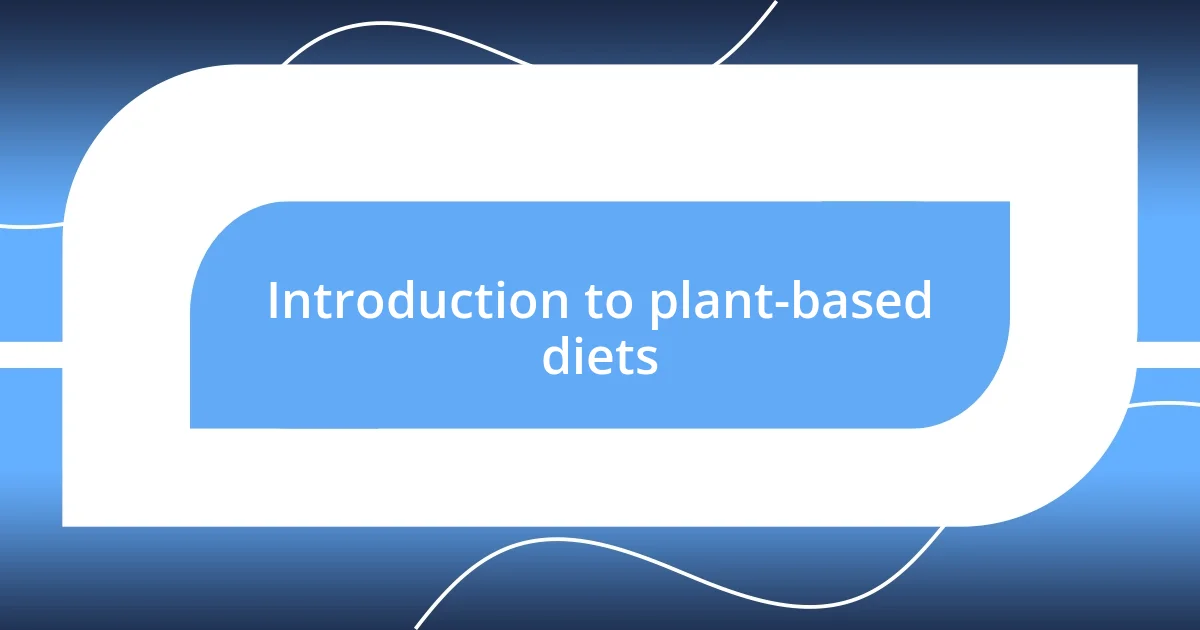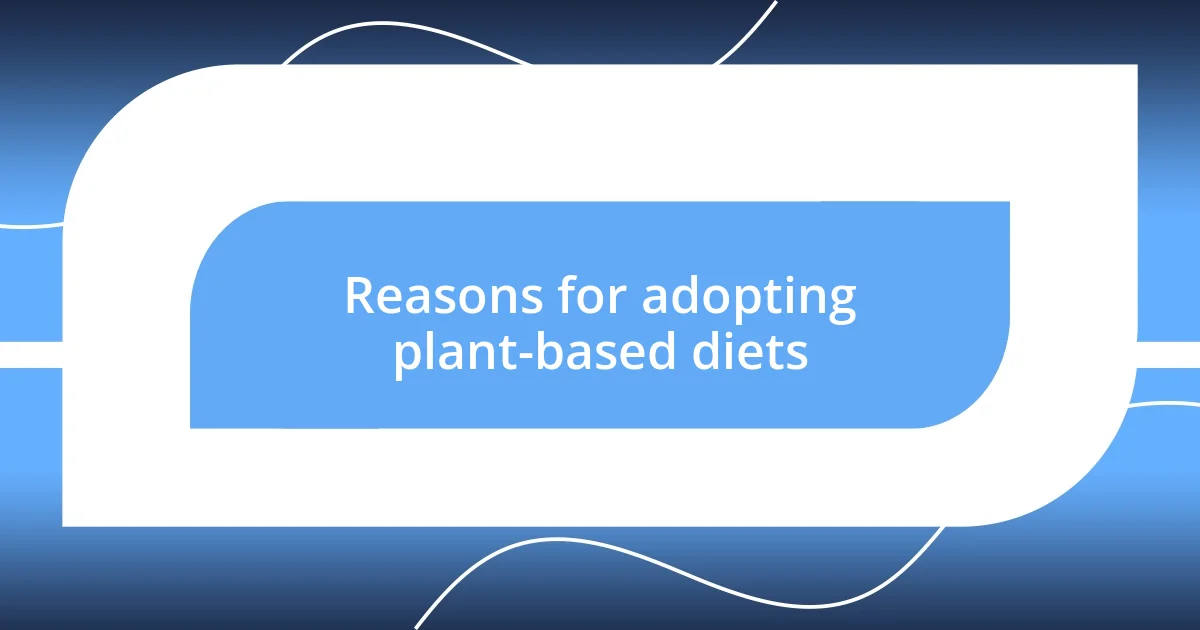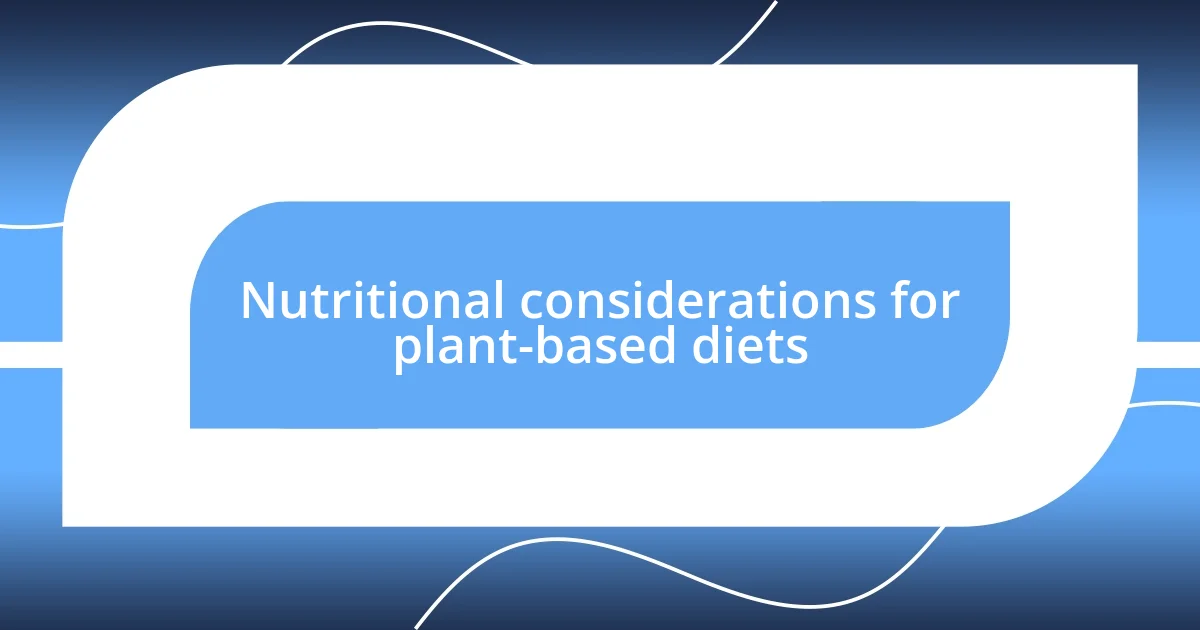Key takeaways:
- The transition to a plant-based diet sparked a journey of health improvement, emphasizing whole, unprocessed foods that enhance both personal well-being and environmental sustainability.
- Key challenges included adjusting meal planning, navigating social situations, and overcoming cravings for comfort foods, which required mindfulness and adaptation.
- Nutritional awareness was crucial; balanced macronutrients and special attention to micronutrients like B12 and iron became central to the author’s successful plant-based lifestyle.

Introduction to plant-based diets
Adopting a plant-based diet has been quite the journey for me, and it’s fascinating how it all started. Initially, I was simply curious about the lifestyle—could I really thrive on fruits, vegetables, legumes, and grains? This curiosity turned into a commitment as I learned about the myriad health benefits, from improved digestion to enhanced energy levels.
One of the most striking aspects of plant-based eating is its emphasis on whole, unprocessed foods. I remember the first time I tasted a ripe, juicy avocado; it felt like a revelation. It made me wonder, have we been overlooking the richness of nature’s offerings in our pursuit of convenience? By replacing processed ingredients with fresh produce, I discovered flavors and textures that transformed my meals into something extraordinary.
As I navigated the world of plant-based foods, I began to appreciate their positive impact not only on my health but also on the environment. It struck me profoundly; every meal I prepared felt like a small yet meaningful contribution towards sustainability. How incredible is it to know that our food choices can echo through the planet? This realization deepened my commitment to this lifestyle, making it more than just a diet but a passion intertwined with my values.

Reasons for adopting plant-based diets
The reasons for adopting a plant-based diet can be quite compelling, especially as I reflect on my own experiences. For me, it began with health; I noticed significant improvements in my energy levels and digestion shortly after I made the switch. It was an exhilarating feeling, as if I had unlocked a new level of vitality I didn’t know I was missing. Beyond personal health, there’s also the ethical dimension—knowing that my choices reduce animal suffering was truly empowering.
Here are some key reasons why I’ve embraced a plant-based diet:
- Health benefits: Improved digestion, increased energy, and reduced risk of chronic diseases.
- Environmental sustainability: Lower carbon footprint and conservation of resources.
- Ethical considerations: Reducing animal suffering and promoting humane practices.
- Culinary exploration: Discovering diverse flavors and cooking methods opened up a whole new world of food.
- Community connection: Building relationships with local farmers and like-minded individuals fosters a sense of belonging.
I can’t ignore how shifting my focus to plant-based eating has made me more mindful about food. Every time I browse a farmer’s market, I feel a connection with the community and the earth—a refreshing reminder of the beauty in simplicity. That sense of purpose in my choices keeps the motivation alive.

Key challenges faced during transition
Transitioning to a plant-based diet isn’t always seamless; I encountered several key challenges along the way. A notable one was adjusting my meal planning. I vividly remember standing in front of my pantry, feeling overwhelmed by the shift from a protein-centric approach to focusing on diverse plant foods. There were times I found myself unsure of how to create balanced meals without relying on meat, which initially led to some frustrating trial-and-error moments in the kitchen.
Another hurdle was the social aspect of dining out or attending gatherings. I felt a bit out of place at barbecues and dinner parties when my options were limited. I recall a friend’s wedding where the main dish was a meat feast—I spotlighted on the plate of side salads while feeling a wave of longing for the usual spread. It taught me to communicate my dietary needs better, but I also had to muster the confidence to advocate for my lifestyle in those scenarios.
Ultimately, the psychological aspect played a central role too. There were instances I battled cravings for familiar comfort foods. I can still remember the nostalgia of a cheesy pizza night. However, I found that replacing those cravings with healthier plant-based alternatives—like a loaded veggie pizza—helped ease that transition. Realizing that healthy food can also be delicious shifted my mindset significantly, fueling my journey forward.
| Challenge | Description |
|---|---|
| Meal Planning | Learning to create balanced meals focused on plant foods. |
| Social Situations | Navigating dining out and events with limited options. |
| Psychological Factors | Overcoming cravings for familiar comfort foods. |

Nutritional considerations for plant-based diets
When I first embraced a plant-based diet, I quickly learned that nutrition is much broader than simply eliminating meat. I discovered the importance of balancing macronutrients—carbohydrates, proteins, and fats—while ensuring I still met my daily nutritional needs. For instance, I was astonished to find myself lacking sufficient protein, often relying too heavily on grains and legumes. This misstep taught me to consciously incorporate a variety of protein sources, like quinoa and chia seeds, into my meals.
One thing that surprised me was how certain micronutrients, like vitamin B12 and iron, often required special attention. I remember feeling uneasy when I realized that these nutrients, typically abundant in animal products, needed to be supplemented or sourced from fortified foods. It made me more proactive about my nutrition choices. Have you ever felt that moment of realization when you’re not only changing your diet but also reforming your approach to overall wellness? That’s precisely what I experienced.
I also found the diversity of plant-based foods to be an incredible journey. Initially, I often stuck to the same few ingredients, which limited the flavors and nutrients in my meals. But as I ventured into the vast world of fruits, vegetables, nuts, and legumes, I became more adventurous. I distinctly recall a day when I experimented with a vibrant kale salad topped with pomegranate seeds and a tahini dressing. The burst of flavors took me by surprise and sparked a genuine excitement for plant-based cooking! It’s those small victories—like discovering a new favorite recipe—that make this journey worthwhile and enriching for both body and soul.














